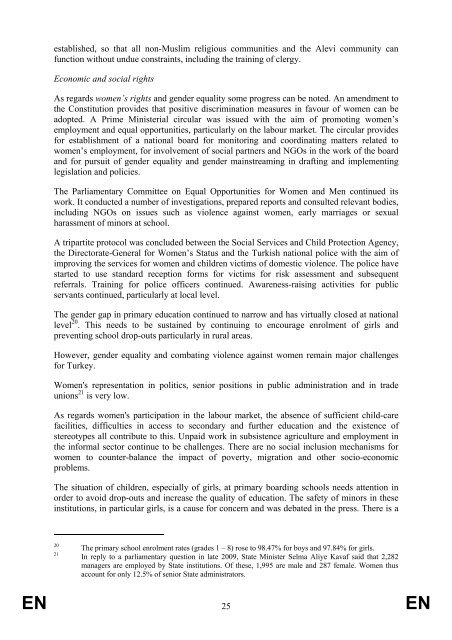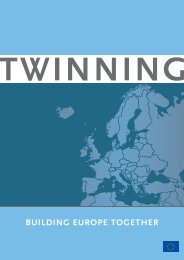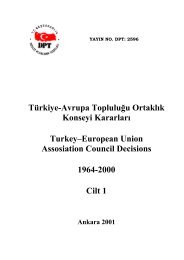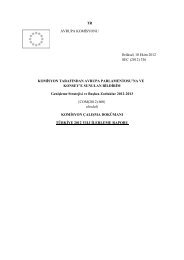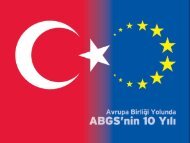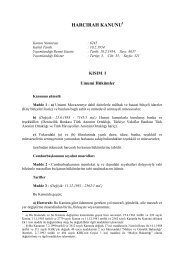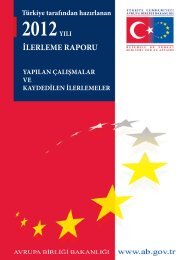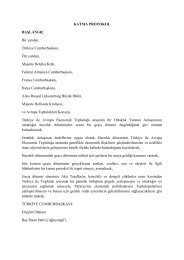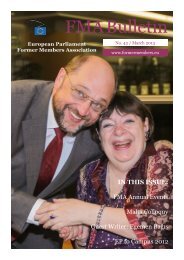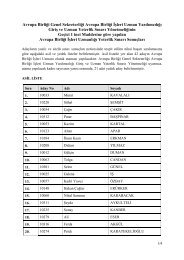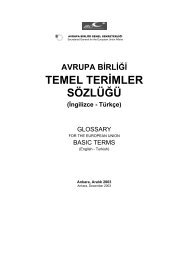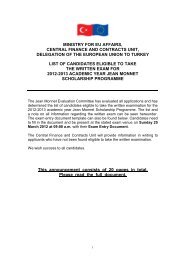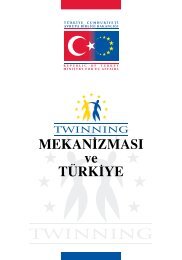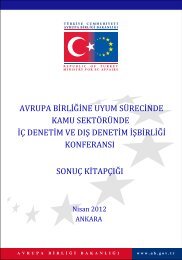2010 ilerleme raporu - Avrupa BirliÄi BakanlıÄı
2010 ilerleme raporu - Avrupa BirliÄi BakanlıÄı
2010 ilerleme raporu - Avrupa BirliÄi BakanlıÄı
You also want an ePaper? Increase the reach of your titles
YUMPU automatically turns print PDFs into web optimized ePapers that Google loves.
established, so that all non-Muslim religious communities and the Alevi community can<br />
function without undue constraints, including the training of clergy.<br />
Economic and social rights<br />
As regards women’s rights and gender equality some progress can be noted. An amendment to<br />
the Constitution provides that positive discrimination measures in favour of women can be<br />
adopted. A Prime Ministerial circular was issued with the aim of promoting women’s<br />
employment and equal opportunities, particularly on the labour market. The circular provides<br />
for establishment of a national board for monitoring and coordinating matters related to<br />
women’s employment, for involvement of social partners and NGOs in the work of the board<br />
and for pursuit of gender equality and gender mainstreaming in drafting and implementing<br />
legislation and policies.<br />
The Parliamentary Committee on Equal Opportunities for Women and Men continued its<br />
work. It conducted a number of investigations, prepared reports and consulted relevant bodies,<br />
including NGOs on issues such as violence against women, early marriages or sexual<br />
harassment of minors at school.<br />
A tripartite protocol was concluded between the Social Services and Child Protection Agency,<br />
the Directorate-General for Women’s Status and the Turkish national police with the aim of<br />
improving the services for women and children victims of domestic violence. The police have<br />
started to use standard reception forms for victims for risk assessment and subsequent<br />
referrals. Training for police officers continued. Awareness-raising activities for public<br />
servants continued, particularly at local level.<br />
The gender gap in primary education continued to narrow and has virtually closed at national<br />
level 20 . This needs to be sustained by continuing to encourage enrolment of girls and<br />
preventing school drop-outs particularly in rural areas.<br />
However, gender equality and combating violence against women remain major challenges<br />
for Turkey.<br />
Women's representation in politics, senior positions in public administration and in trade<br />
unions 21 is very low.<br />
As regards women's participation in the labour market, the absence of sufficient child-care<br />
facilities, difficulties in access to secondary and further education and the existence of<br />
stereotypes all contribute to this. Unpaid work in subsistence agriculture and employment in<br />
the informal sector continue to be challenges. There are no social inclusion mechanisms for<br />
women to counter-balance the impact of poverty, migration and other socio-economic<br />
problems.<br />
The situation of children, especially of girls, at primary boarding schools needs attention in<br />
order to avoid drop-outs and increase the quality of education. The safety of minors in these<br />
institutions, in particular girls, is a cause for concern and was debated in the press. There is a<br />
20<br />
21<br />
The primary school enrolment rates (grades 1 – 8) rose to 98.47% for boys and 97.84% for girls.<br />
In reply to a parliamentary question in late 2009, State Minister Selma Aliye Kavaf said that 2,282<br />
managers are employed by State institutions. Of these, 1,995 are male and 287 female. Women thus<br />
account for only 12.5% of senior State administrators.<br />
EN 25 EN


